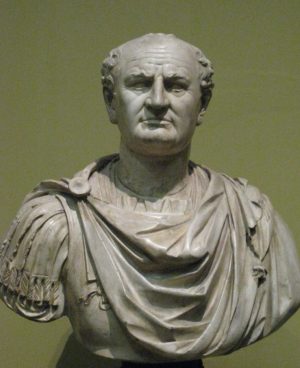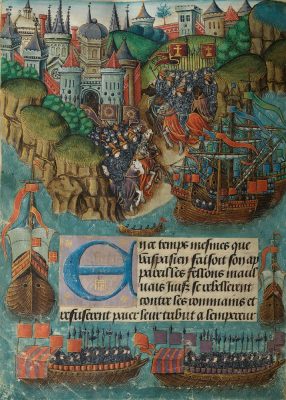Vespasian was the fourth emperor during the Year of Four Emperors, the last to come into power during the civil war in Rome in AD 69. He was the pioneer of the Flavian dynasty which reigned for 27 years starting with Vespasian who was succeeded by his sons, Titus and Domitian respectively. He had a senatorial background but was widely known for his military triumphs. Vespasian represented Legio II Augusta when the Romans invaded Britain in 43. He also conquered Judaea in the Jewish rebellion in 66. As emperor he led the Empire into a period of stability, rehabilitating Rome with an extensive building program.
Family Background
Born with the name Titus Flavius Vespasianus, Vespasian became the first emperor who originated from an equestrian family. He had a modest lineage, coming from an obscure family that rose up with accumulated wealth from his father, Titus Flavius Sabinus. His father was a tax collector and Roman moneylender while his mother, Vespasia Polla, also came from an equestrian background. His grandfather through his mother’s side was elevated to the rank of prefect of the camp and then senator.
Vespasian was born in Falacrinae, a village on the northeast side of Rome. His early years were spent in the countryside, in Cosa, in his grandmother’s home. It was during this time that Vespasian was left in the shadow of his older brother’s achievements as he continuously went up the cursus honorum. Later on, Vespasian and his older brother fulfilled their roles as legate to Aulus Plautius in Britain.
Political and Military Career
Vespasian quickly climbed the ranks, gaining military experience in Danube and then serving as a soldier in the military tribune in 36. He was chosen as a quaestor in Creta et Cyrenaica and then held higher positions in public office.
In order to become a praetor, Vespasian was required two periods of service in one military magistracy and one public magistracy. He served in the army in Thracia for around three years. In 30, he arrived in Rome once again and took on a role in the vigintivirate, possibly overseeing street cleaning. The viginvitirate was an administrative council that consisted of twenty men in the Roman government. He did not perform as expected and was reprimanded by Emperor Caligula who brought dirt from the streets to give to Vespasian.
Once Sejanus was rising in power, accounts discussing Vespasian were difficult to find. Sejanus was part of the Roman army and eventually gained power as the Roman imperial bodyguard as a prefect in around the year 30.
Vespasian resurfaced when he finished his term as a vigintivirate. After this, he was a quaestor, having gained the honor of being elected as such. Vespasian then aimed for the praetorship, getting rejected for an aedileship on the first try but succeeding on the second. Without any family members or a successful track record, he was able to rise up to praetor in 39 or 40. It was possible that he was able to achieve this through his connection to a freedwoman named Antonia Caenis who was the confidential secretary of the emperor’s wife.
After Vespasian’s successes as Legio II Augusta’s legate, Vespasian became a consul in 51 but retired after some time due to a conflict with Agrippina, Claudius’ wife who was a heavy influence during Emperor Cladius’ reign. In 62, Vespasian went back to work as the consul of Africa province. His years in this position were marked with building connections which proved to be of use later on in his career.
Vespasian was assigned to quell the Jewish revolt which was gaining traction in Judaea in 66. He championed the effort with his first son, Titus. He himself led two legions in the area while Titus traveled to Alexandria with a legion as well. The Jewish resistance leader named Flavius Josephus who was in captivity during the Siege of Yodfat spoke highly of Vespasian, claiming he was human and just.
Ascension to the Throne
The Year of the Four Emperors was marked with a continuous transfer of power, from Galba to Otho to Vitellius. In the aftermath of Nero’s suicide, the civil war only continued to morph into chaos due to constant change from one emperor to another.
While still reigning, Vespasian caught wind of a prophecy known throughout the Eastern provinces which states that the future emperors of the empire were to originate from Judaea. He held the belief that this was a prophecy about himself and slowly began holding audiences with Eastern generals in 69 in order to put a plan into place.
When Mucianus requested Vespasian to claim the throne from Emperor Vitellius in May of the Year of the Four Emperors, Vespasian was officially proclaimed as the emperor in July. Mucianus and Vespasian were longtime allies after they clashed during the Jewish revolt in 67. They later gave their allegiance to Otho and in the wake of the civil war, Mucianus pleaded upon Vespasian to fight for the emperorship.
At the start of that July, the legions in Alexandria all swore their loyalty to Vespasian, with Judaean legions and Syrian legions doing the same on July 15. Vespasian’s connections garnered him more armies, Illyricum, Moesia, and Pannonia equally pledging their support to him soon after. He was accepted as Emperor by half of the Roman population.
However, Vitellius’ competent and experienced soldiers from Rhineland and Gaul were still capable of winning the battle.
Vespasian stayed in Egypt, guarding the grain supply when his supporters, led by Marcus Antonius Primus or Antonius, arrived in Italy. They overcame Vitellius’ army in the place they formerly called their victory, Bedriacum. The armies traversed to Rome as Vitellius hurriedly attempted to abdicate the throne. Vitellius’ supporters and the Praetorian Guard rejected Vitellius’ pleas. Once Antonius’ soldiers entered the city chaos ensued. One of the casualties during the invasion of Rome was Sabinus, Vespasian’s older brother.
Vitellius was killed barbarically by Vespasian’s supporters and Vespasian was recognized as Emperor. In the aftermath of the civil war, Vespasian swiftly provided grain to Rome, relief for the citizens.
Reign
The Egyptians had already announced Vespasian’s emperorship and later on the Senate pronounced him emperor of Rome on December 21, 69, establishing his formal reign. At the beginning of Vespasian’s rule, Mucianus quickly enforced a tax reform in order to restore the empire’s funds. This continued even when Vespasian reached Rome in the next year.
His long stay in Egypt solidified his support in the area. Over in Alexandria, the tax reforms were met with hostility, evidenced by protests from the citizens. Vespasian sorted the matter and allowed for steady grain shipments. Conflicts continued in Egypt throughout 70 until Vespasian’s son, Titus was able to quash the rebels in the same year.
The year 70 also saw a rebellion in Gaul and Germany which was called the Batavian Rebellion, led by Julius Sabinus and Gaius Julius Civilis. They were later conquered by Quintus Petillius Cerialis, Vespasian’s son-in-law at the end of the year.
Upon arriving in Rome, Vespasian bestowed the populace and soldiers with gifts in order to garner their support during his reign. Despite his efforts to win the favor of the citizens, the high tax rates had resulted in several conspiracies to kill him.
Projects
Vespasian set out to construct numerous structures in Rome during his reign. The high taxes were used in order to create massive architectural feats. He partially restored Rome after the civil war in the Year of the Four Emperors. His sons who succeeded him continued to rebuild Rome in the aftermath. Vespasian had the Temple of Peace and the Temple of Deified Claudius constructed. He also finished Nero’s initiative to create a gargantuan statue of Apollo. One of his most notable initiatives was that of the Colosseum from funds originating from the Jewish Temple succeeding the Siege of Jerusalem.
Death
In 79, Vespasian fell ill in Campania and traveled back to Rome as soon as he could. His sickness only worsened despite his efforts to live in the countryside and he suffered from severe diarrhea. He died on June 23, 79 in Aquae Cutiliae. His eldest son Titus succeeded him.

